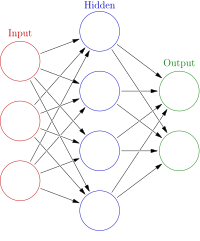
Photo from wikipedia
Flooding threatens soybean production and limits soybean yields worldwide. The most effective and economic approach to decrease loss of yield due to flooding is to develop flood-tolerant soybean cultivars. The… Click to show full abstract
Flooding threatens soybean production and limits soybean yields worldwide. The most effective and economic approach to decrease loss of yield due to flooding is to develop flood-tolerant soybean cultivars. The objective of this study was to identify genetic loci and candidate genes associated with flooding tolerance. A panel of 384 soybean plant introductions (PIs) was evaluated for flooding tolerance in two consecutive years in the field. The plant foliar damage score was used to index soybean response to flooding stress. A total of 42,291 SNP markers were obtained from the Illumina Infinium SoySNP50K BeadChip database. After filtration for quality control, 31,125 SNPs were used for genome-wide association mapping utilizing four different models (regression linear model (GLM), mixed linear model (MLM), compressed mixed linear model (CMLM), and enriched compressed mixed linear model (ECMLM)). Fourteen SNPs were identified to be associated with flooding tolerance across all environments and models at a significance level of −Log10 (P) ≥ 2.5. Five SNPs were located within the coding regions of five candidate genes. Several PIs with lower best linear unbiased prediction (BLUPs) of the breeding values and a large number of favorable flood-tolerant alleles were found as new genetic sources for use in soybean breeding programs.
Journal Title: Molecular Breeding
Year Published: 2019
Link to full text (if available)
Share on Social Media: Sign Up to like & get
recommendations!